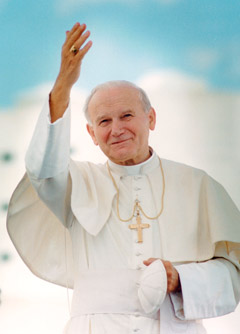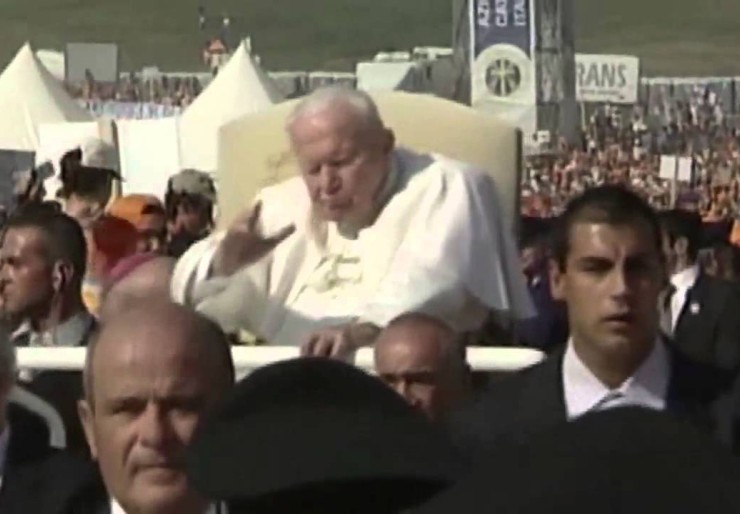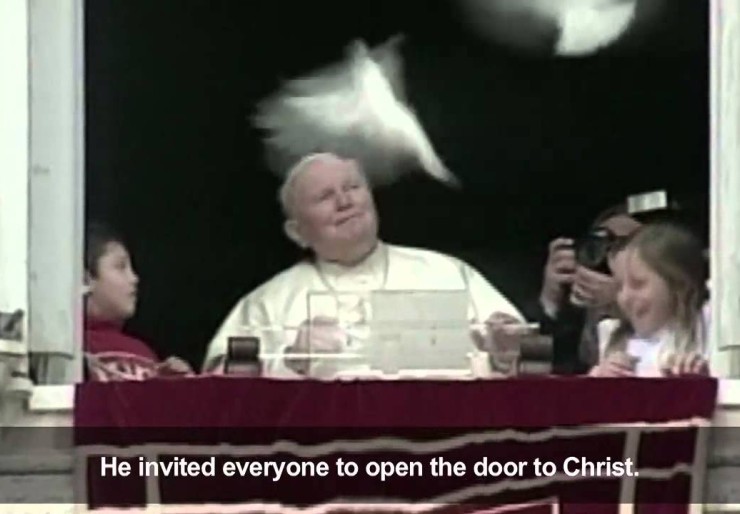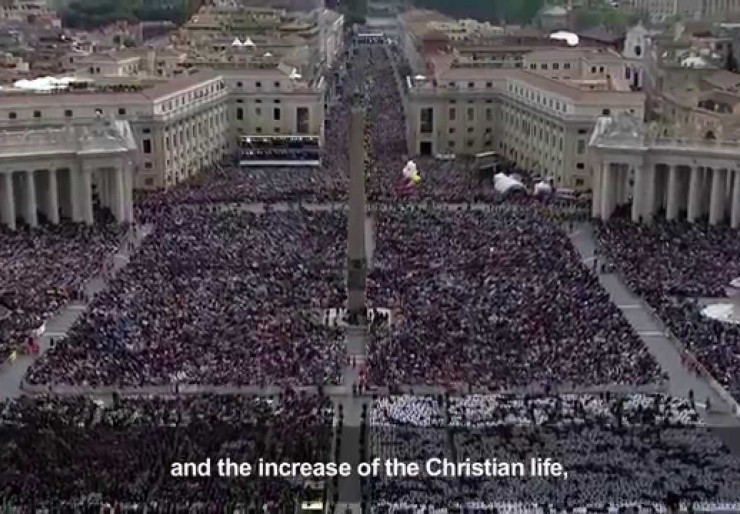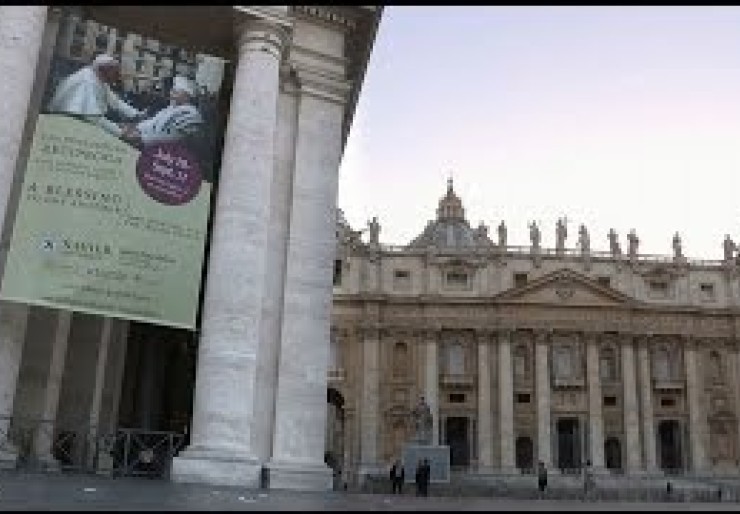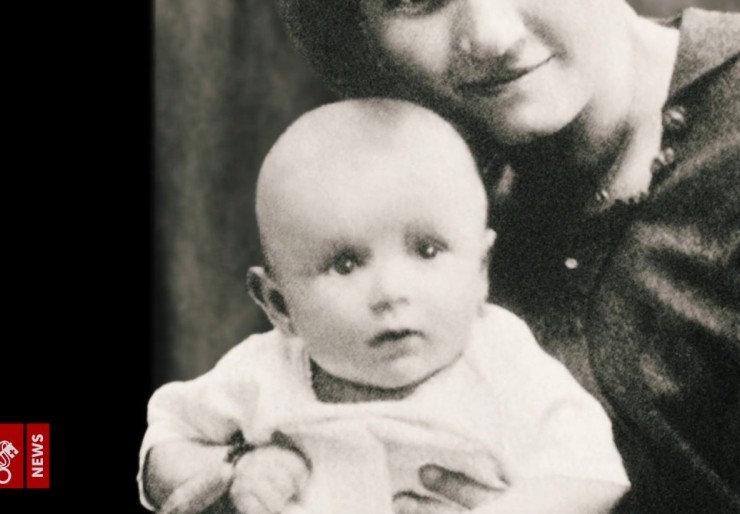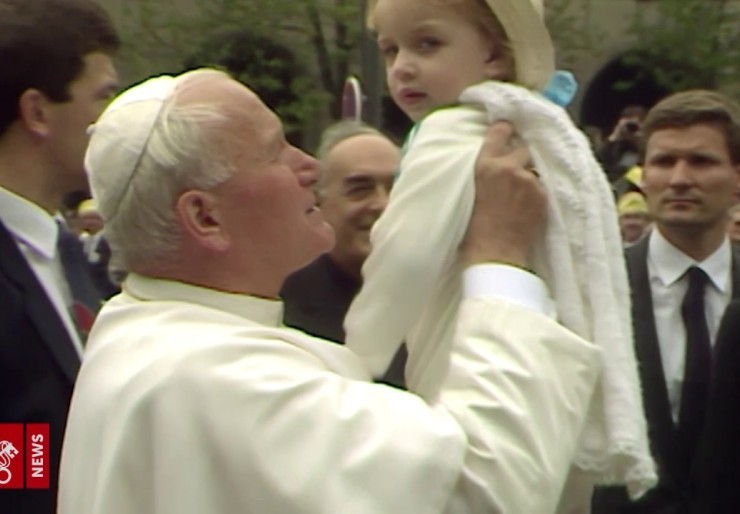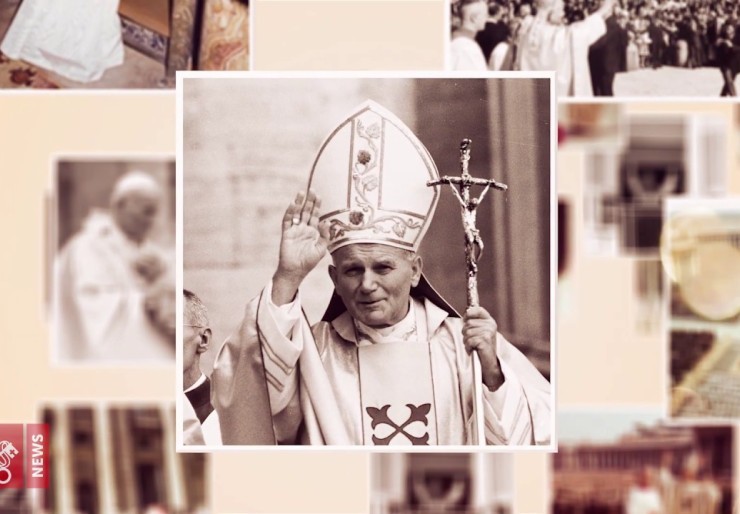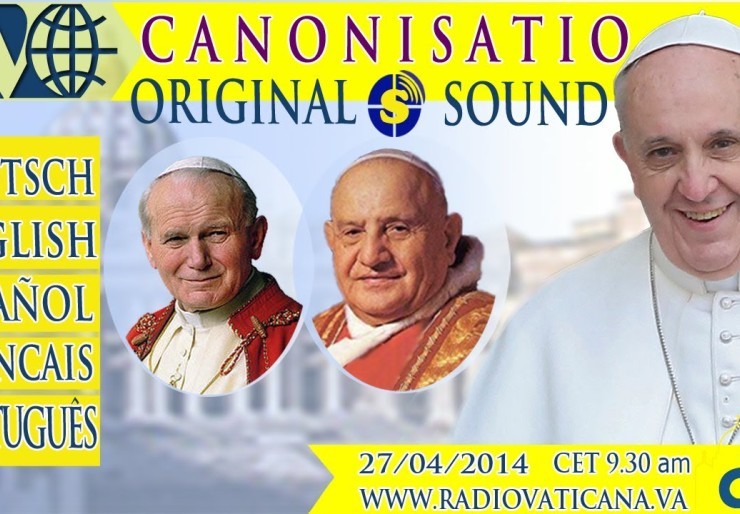Pope John Paul II
263rd successor to St. Peter
On October 16, 1978, Cardinal Karol Wojtyla, Archbishop of Krakow, was elected the 263rd successor to Saint Peter and chose the name John Paul II in honor of the late John Paul I. Pope John Paul II was the first ever Slavic pope elected, and at 58-years-old, he was youngest pope in over a century. During his twenty-six-year pontificate, he visited over 129 countries, which included seven visits to the United States. He died on April 2, 2005, beatified in St. Peter's Square on May 1, 2011, by Pope Benedict XVI, and canonized on April 27, 2014, by Pope Francis. His feast day is October 22. Read his full biography on the on the Vatican website.
Quick Facts
| Date of Birth | May 18, 1920 |
| Country of Origin | Wadowice, Poland |
| Area of Study | Philosophy and Literature |
| Priesthood Ordination | November 1, 1946 |
| Episcopal Ordination | July 4, 1589 |
| Pontificate | 1978 - 2005 |
| Personal Motto | Totus Tuus (All to Mary) |
Timeline
-
1920
May 18: Karol Wojtyla, Jr., is born in Wadowice, Poland.
June 20: He is baptized in the Church of the Presentation of the Blessed Virgin Mary.
-
1929
April 13: His mother, Emilia Kaczorowska, dies of kidney and heart failure.
-
1932
December 5: His brother, Edmund, dies of scarlet fever.
-
1938
Moves to Krakow with father; enters Jagellonian University, joins experimental theater group.
-
1941
February 18: His father, Karol Wojtyła, Sr., dies.
-
1942
Enters secret seminary in Krakow.
-
1945
World War II ends; he resumes studies at Jagellonian University.
-
1946
November 1: Karol is ordained a priest.
-
1948
June: He earns a doctorate in theology.
-
1954
Begins teaching philosophy at Catholic University of Lublin; earns doctorate in philosophy.
-
1958
September 28: He is ordained auxiliary bishop of Krakow.
-
1962
Goes to Rome for the first session of the Second Vatican Council.
-
1964
Ordained Archbishop of Krakow
-
1965
Makes three trips to Rome to help redraft Vatican II document on church in modern world; attends final council session.
-
1967
June 26: He is elevated to cardinal.
-
1978
October 16: He is elected Pope John Paul II.
-
1979
Visits Dominican Republic and Mexico, his first of 104 trips abroad as pope (January 25); also visits Poland, Ireland, United States and Turkey; publishes first encyclical, apostolic exhortation; convenes first plenary meeting of College of Cardinals in more than 400 years.
-
1980
Convenes special Dutch synod to straighten out problems in Dutch church; becomes first modern pope to hear confessions in St. Peter's Basilica.
-
1981
May 13: Pope John Paul II is shot by Turkish terrorist Mehmet Ali Agca. John Paul II is taken to Gemelli Hospital, where he undergoes a six-hour operation.
-
1982
April 1: He receives credentials of the first British ambassador to the Vatican since Henry VIII, an historic achievement.
May 13: Marks anniversary of attempt on his life with trip to Fatima, Portugal
-
1983
January 25: He publishes Sacrae Disciplinae Leges, the revised Code of Canon Law.
December 27: Pope John Paul II visits Mehmet Ali Agca, the man who attempted to assassinate him, in prison.
-
1984
January 10: Full diplomatic relations are established between the Holy See and the United States of America. (Previously, the U.S. had no ambassador to the Vatican and the Holy See had no embassy in America.)
February 18: The New Concordat between the Holy See and the Italian Republic on the revision of the 1929 Lateran Treaty is signed.
-
1986
Makes historic visit to Rome's synagogue; calls world religious leaders to Assisi to pray for peace
-
1987
Opens Marian year and writes encyclical on Mary; attends first international World Youth Day in Argentina.
-
1988
Approves issuance of Holy See's first public financial report; issues encyclical, "On Social Concerns"; issues letter defending women's equality but saying they cannot be ordained priests; sets up Vatican commission to try reconciling followers of schismatic Archbishop Marcel Lefebvre.
-
1989
December 1: Official visit of Secretary General Mikhail Gorbachev of the U.S.S.R. to the Vatican. This marks the first time a pope met with the head of the Soviet Union.
-
1990
October 18: John Paul II promulgates the Code of Canon Law for Oriental (Eastern or Byzantine) Churches.
-
1991
Issues encyclical marking one hundred years of Catholic social teaching; convenes special European synod to deal with rapid changes in the wake of communism's collapse.
-
1992
December 7: He officially presents the revised Catechism of the Catholic Church to the College of Cardinals.
-
1993
Writes first papal encyclical on nature of moral theology.
December 30: Signs an agreement that establishes formal diplomatic relations between Israel and the Holy See.
-
1994
October 24: Autobiography, Crossing the Threshold of Hope, is published.
-
1997
Names St. Therese of Lisieux a doctor of the church; presides at synod for America, one of a series of regional synods.
-
1998
Makes historic visit to Cuba; starts first permanent Catholic-Muslim dialogue.
-
1999
March 1: Approves the beginning of the cause of beatification for Mother Teresa of Calcutta.
December 24: He opens the Holy Door at St. Peter’s Basilica, inaugurating Jubilee Year 2000.
-
2000
Presides at numerous jubilee year events in Rome; makes historic visit to Holy Land
-
2003
Marks 25th anniversary as pope; beatifies Mother Teresa of Kolkata, one of record number of beatifications and canonizations under his pontificate
-
2005
Publishes new book, "Memory and Identity: Conversations Between Millenniums"
Encyclicals
| Title | Date |
| Ecclesia de Eucharistia | April 17, 2003 |
| Fides et Ratio | September 14, 1998 |
| Ut Unum Sint | May 25, 1995 |
| Evangelium Vitae | March 25, 1995 |
| Veritatis Splendor | August 6, 1993 |
| Centesimus Annus | May 1, 1991 |
| Redemptoris Missio | December 7, 1990 |
| Sollicitudo Rei Socialis | December 30, 1987 |
| Redemptoris Mater | March 25, 1987 |
| Dominum et vivificantem | May 18, 1986 |
| Slavorum Apostoli | June 2, 1985 |
| Laborem Excercens | September 14, 1981 |
| Dives in Misericordi | November 30, 1980 |
| Redemtor Hominis | March 4, 1979 |
Apostolic Exhortations
| Title | Date |
| Pastores Gregis | October 16, 2003 |
| Ecclesia in Europa | June 28, 2003 |
| Ecclesia in Oceania | November 22, 2001 |
| Ecclesia in Asia | November 6, 1999 |
| Ecclesia in America | January 22, 1999 |
| A New Hope for Lebanon | May 10, 1997 |
| Vita Consecrata | March 25, 1996 |
| Ecclesia in Africa | September 14, 1995 |
| Pastores Dabo Vobis | March 15, 1992 |
| Redemptoris Custos | August 15, 1989 |
| Christifideles Laici | December 30, 1988 |
| Reconciliatio et Paenitentia | December 2, 1984 |
| Redemptionis Donum | March 25, 1984 |
| Familiaris Consortio | November 22, 1981 |
| Catechesi Tradendae | October 16, 1979 |
Pope John Paul II Quotes
-
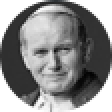
"Freedom consists not in doing what we like, but in having the right to do what we ought." (Homily, October 8, 1995)
– Pope John Paul II
-

"As the family goes, so goes the nation and so goes the whole world in which we live." (Homily, November 30, 1986)
– Pope John Paul II
-

"Only in Christ can men and women find answers to the ultimate questions that trouble them. Only in Christ can they fully understand their dignity as persons created and loved by God. Jesus Christ is "the only Son from the Father…full of grace and truth." (World Youth Day, 1993)
– Pope John Paul II
-

"The situation of the world's migrants and refugees seems ever more precarious. Violence sometimes obliges entire populations to leave their homeland to escape repeated atrocities; more frequently, it is poverty and the lack of prospects for development which spur individuals and families to go into exile, to seek ways to survive in distant lands, where it is not easy to find a suitable welcome." (World Migration Day, 1998.)
– Pope John Paul II
-

"Do not abandon yourselves to despair. We are the Easter people and hallelujah is our song." (Homily, November 30, 1986)
– Pope John Paul II
-

"To modern men and women, often dissatisfied with a shallow and ephemeral existence, and in search of authentic happiness and love, Christ offers his own example and issues the invitation to follow Him. He asks those who hear his voice to give their lives for others. This sacrifice is a source of self-fulfillment and joy, as is seen in the eloquent example of those men and women who, leaving all security behind, have not hesitated to risk their lives as missionaries in different parts of the world. It can also be seen in the response of those young people who, prompted by faith, have embraced a vocation to the priesthood or the religious life in order to serve God's plan of salvation." (Holy Father's Message for Lent, 2003)
– Pope John Paul II
-

"It is Jesus that you seek when you dream of happiness; He is waiting for you when nothing else you find satisfies you; He is the beauty to which you are so attracted; it is He who provoked you with that thirst for fullness that will not let you settle for compromise; it is He who urges you to shed the masks of a false life; it is He who reads in your hearts your most genuine choices, the choices that others try to stifle." (15th World Youth Day, August 19, 2000)
– Pope John Paul II
-

"Do not be afraid. Open wide the doors for Christ." (Homily for the Inauguration of his Pontificate, October 22, 1978)
– Pope John Paul II
-

"God has assigned as a duty to every man the dignity of every woman." (General Audience, November 24, 1982)
– Pope John Paul II
-

"Darkness can only be scattered by light. Hatred can only be conquered by love." (Address to the Diplomatic Corps, January 10, 2002)
– Pope John Paul II

